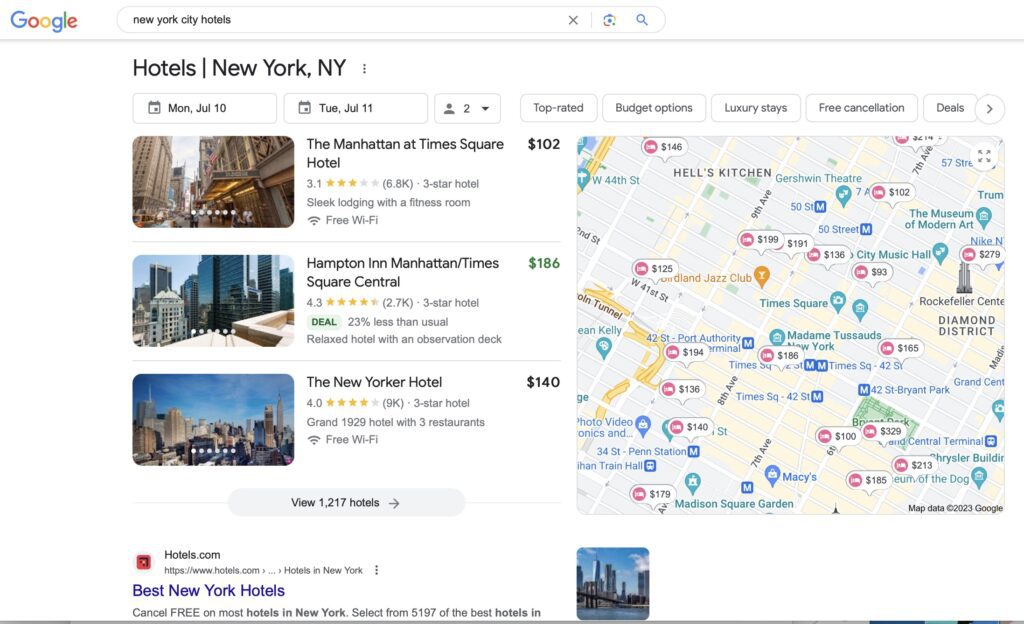Skift Take
The fine print would ultimately determine the financial impact of the Digital Markets Act. But the fact that Booking Holdings filed a statement from Booking.com with the U.S. Securities and Exchange Commission about it this week means it believes the repercussions could be material to its operations.
Google is among the platforms that have informed the European Union that it meets the definition of being a “gatekeeper,” and Booking.com stated this week that it expects to meet that criteria “at the end of 2023.”
What this means under the European Union’s Digital Markets Act is that tech companies of this size — having at least an $82 billion market cap and 45 million active monthly users — will see some of their operations or business practices restricted. Meta/Facebook/Whatsapp, Amazon, Apple and Microsoft would also feel the pain.
In travel within the European Union, Google would be be barred from favoring its Google Travel ecosystem in search results over the free results from companies such as Expedia, Tripadvisor, Booking Holdings and so many other smaller competitors.
One of the ways Google currently self-favors its own business is by placing its splashy map with hotel prices and search results high atop its pages above free results like those from Hotels.com and others. (See the accompanying image.)
The search results within the box are free, namely they are not advertisements, but when users click on one they navigate into the Google Travel universe of ads and free links. Although Hotels.com undoubtedly gets some clicks, too, you can bet your next paycheck that many more users click on the featured results in the colorful box/map, and end up in Google Travel.

Source: Google
“I share Theodore Roosevelt’s reservations about monopolies,” said David Soskin, a partner at Howzat Partners, which invested in several travel companies, including Momondo, which was acquired by Kayak. “Since the earliest days of the internet, travel has been a robust and competitive sector known for its innovation and global entrepreneurship. Putting a restraint on what Google is allowed to do is in the interest of the sector as well as consumers.”
Google declined to comment on the potential impact of its gatekeeper designation in Europe.
The Digital Markets Act would also force these gatekeeper companies by March 2024 to take actions such as:
- Provide transparency about how their algorithms work;
- Cease blocking users from uninstalling pre-installed apps, and
- Make their messaging apps interoperable with those from rival companies.
The idea behind then Digital Markets Act is to force these large platforms to preserve competitiveness, but the fine print will determine any adverse financial impact that these companies would face.
They would be subject to fines up to 10% of their global revenue, or “turnover,” for breaking the rules.
It’s less clear at this juncture precisely how Amsterdam-based Booking.com’s business would be impacted by the Digital Markets Act, but it assuredly doesn’t welcome the designation. Booking.com is the largest brand within the Booking Holdings portfolio, which also includes, Priceline, Kayak and Agoda, among others.
A Bernstein research report in April stated: “Booking is the smallest company potentially affected by the DMA, and as such likely to be the least targeted by the rules; but it is also the company with the highest European exposure. We would expect only limited financial impact on Booking.”
Meanwhile, Booking.com is still apparently trying to negotiate with the European Union.
“Booking.com confirmed today that it remains engaged in constructive discussions with the European Commission on the applicability of the Digital Markets Act (“DMA”) to its business, and looks forward to continuing this dialogue,” the company stated in a financial filing with the Securities and Exchange Commission earlier this week.
The Daily Newsletter
Our daily coverage of the global travel industry. Written by editors and analysts from across Skift’s brands.
Have a confidential tip for Skift? Get in touch
Tags: alphabet, amazon, antitrust, apple, booking holdings, booking.com, digital markets act, eu, european union, facebook, google, meta, microsoft, online travel newsletter, regulations, whatsapp
Photo credit: The European Union may crimp the operations of Google Travel and Booking.com under its Digital Markets Act. Source: Arkan Perdana/Unsplash https://unsplash.com/@arkanperdana Arkan Perdana / Unsplash
